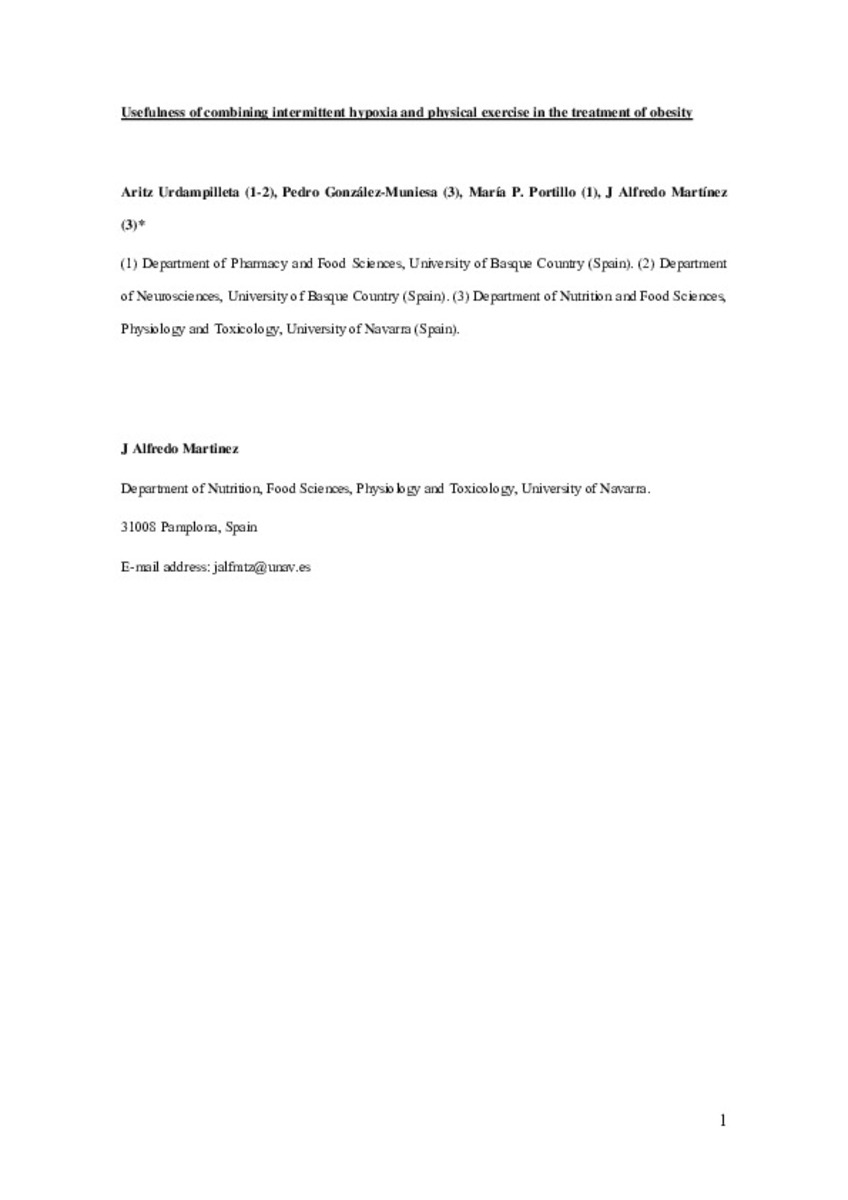Full metadata record
| DC Field | Value | Language |
|---|---|---|
| dc.creator | Urdampilleta, A. (Aritz) | - |
| dc.creator | Gonzalez-Muniesa, P. (Pedro) | - |
| dc.creator | Portillo, M.P. (María P.) | - |
| dc.creator | Martinez, J.A. (José Alfredo) | - |
| dc.date.accessioned | 2014-11-21T13:50:55Z | - |
| dc.date.available | 2014-11-21T13:50:55Z | - |
| dc.date.issued | 2012 | - |
| dc.identifier.citation | Urdampilleta A, González-Muniesa P, Portillo MP, Martínez JA. Usefulness of combining intermittent hypoxia and physical exercise in the treatment of obesity. J Physiol Biochem. 2012 Jun;68(2):289-304 | es_ES |
| dc.identifier.issn | 1138-7548 | - |
| dc.identifier.uri | https://hdl.handle.net/10171/37077 | - |
| dc.description.abstract | Obesity is an important public health problem worldwide and is a major risk factor for a number of chronic diseases such as type 2 diabetes, adverse cardiovascular events and metabolic syndrome related features. Different treatments have been applied to tackle body fat accumulation and its associated clinical manifestations. Often, relevant weight loss is achieved during the first six months under different dietary treatments. From this point, a plateau is reached, and a gradual recovery of the lost weight may occur. Therefore, new research approaches are being investigated to assure weight maintenance. Pioneering investigations have reported that oxygen variations in organic systems may produce changes in body composition. Possible applications of intermittent hypoxia to promote health and in various pathophysiological states have been reported. The hypoxic stimulus in addition to diet and exercise can be an interesting approach to lose weight, by inducing higher basal noradrenalin levels and other metabolic changes whose mechanisms are still unclear. Indeed, hypoxic situations increase the diameter of arterioles, produce peripheral vasodilatation and decrease arterial blood pressure. Furthermore, hypoxic training increases the activity of glycolytic enzymes, enhancing the number of mitochondria and glucose transporter GLUT-4 levels as well as improving insulin sensitivity. Moreover, hypoxia increases blood serotonin, decreases leptin levels while appetite is suppressed. These observations allow considering the hypothesis that intermittent hypoxia induces fat loss and may ameliorate cardiovascular health, which might be of interest for the treatment of obesity. This new strategy may be useful and practical for clinical applications in obese patients. | es_ES |
| dc.language.iso | eng | es_ES |
| dc.publisher | Springer Verlag | es_ES |
| dc.rights | info:eu-repo/semantics/openAccess | es_ES |
| dc.subject | Obesity | es_ES |
| dc.subject | Body weight loss | es_ES |
| dc.subject | Intermittent hypoxia | es_ES |
| dc.subject | Treatment | es_ES |
| dc.title | Usefulness of combining intermittent hypoxia and physical exercise in the treatment of obesity | es_ES |
| dc.type | info:eu-repo/semantics/article | es_ES |
| dc.identifier.doi | http://dx.doi.org/10.1007/s13105-011-0115-1 | es_ES |
Files in This Item:
Statistics and impact
Items in Dadun are protected by copyright, with all rights reserved, unless otherwise indicated.






